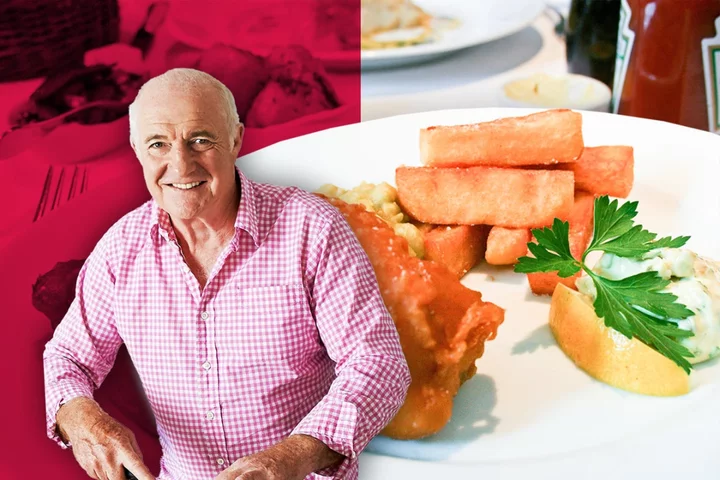Leave Rick Stein alone, Padstow penny pinchers – it’s totally reasonable to charge £2 for mayo and ketchup
First, they came for our energy bills. Now, they’re waging war on our beloved fish and chips. When will the tyranny end? Probably not any time soon and certainly not in Padstow, where Rick Stein has decided to add a £2 surcharge for extras like gravy, curry sauce and aioli at his fish and chippy. Apparently even celebrity can’t protect you from “food inflation, energy costs and rising wages”. Naturally, all hell broke loose among Padstow punters, who were outraged at the additional cost to their already £20 order. “I’ve always felt that there’s something of the night about him,” one decried. “Let’s boycott it,” exclaimed another. Let me add an unpopular opinion to the opprobrium. Back off, penny pinchers. Ketchup doesn’t come for free just because you decided to dine at Stein’s. It’s a product like any other, and it comes with a price. Why should Stein, or any other restaurant, have to pay it? As a restaurant critic, I’m aware that dinner is getting quite dear. But my advice for anyone complaining about prices is: have some perspective. My initial thoughts on hearing the news from Padstow were twofold. Firstly, if you don’t want to pay upwards of £20 for fish and chips, why don’t you just… go somewhere else? Stein’s is hardly the only joint in town. It’s also not the highest rated so if you are splashing the cash, splash it elsewhere. Secondly, what do people expect? Prices are going up in every aspect of our lives. Restauranteurs aren’t immune to that – they face exactly the same problems we do, if not more. The only thing alarming about the news is that even a brand as big as Rick Stein’s is struggling to survive. For a sachet of Heinz mayonnaise, sure, Stein should probably suck it up (though I imagine that, too, costs more these days). But is it so far-fetched to charge for condiments that are made in house, on the day, with quality ingredients, by trained chefs? Yes, Stein could just plonk it onto his already extortionate prices (£16.95 for cod and chips? You must be joking), but I imagine you might have a thing or two to say about that as well. At least he’s giving you the choice of paying for condiments at all. If you replicated the recipe at home, I’d be surprised if you could get the ingredients for under £2 in the supermarket. That perspective should extend to the impact our changing climate has had on fishing. We’re catching far fewer fish, which has driven up the price of a catch by 11 per cent in the last year. Politics also plays a role, where tariffs on Russia, which previously supplied 40 per cent of white fish in the UK, have forced fishermen to cast their nets elsewhere. The cost of vegetable oil has also gone up by 80p per litre. Given the fish and chip industry uses somewhere in the region 100,000 tons of the stuff, that’s an enormous cost for restaurants to shoulder. Even potatoes are heading upwards of £400 per ton due to increased fertiliser costs and the impact of last year’s hot summer. Then there’s the energy crisis – businesses don’t enjoy a price cap. You can see what I’m getting at. It’s a perfect storm. While arguments that a business as big as Stein’s should be able to absorb the costs somewhere in the empire are totally fair, the news reflects the struggle of all restaurants to reconcile spiralling costs with diner expectations. Earlier this year, Mandy Yin, owner of London laksa bar Sambal Shiok, responded to complaints from diners that prices were too high with a detailed breakdown of how much it costs to produce a single dish. From a portion of their £13 fried chicken, the business only makes 30p. This whole debacle also reminds me of a conversation I had recently with Charlie Bigham, a household name mainly for his boujie “ready meals” (he despises the term). When I asked him to justify why his fish pie now costs around £10 for two people, he gave me the usual spiel about rising costs etcetera, then asked: but why are we so obsessed with paying less and less for food? If we care about the quality of the produce, the impact on the environment and fair pay for the people that work in the industry, shouldn’t we be prepared to pay a bit more? For those lucky enough to be in the contingent that can afford fish and chips, £2 curry sauce might not be the hill to die on. Don’t get me wrong: I think it’s outrageous. But I don’t blame the restaurants. Next time you’re in Padstow, a little understanding, perspective and kindness would go a long way. Read More London’s best new restaurants: From Spanish-Welsh fusion at Mountain to British kitsch at 20 Berkeley The dish that defines me: Michele Pascarella’s Neapolitan ragu Is bottomless prosecco going to be killed off by climate change?

First, they came for our energy bills. Now, they’re waging war on our beloved fish and chips. When will the tyranny end?
Probably not any time soon and certainly not in Padstow, where Rick Stein has decided to add a £2 surcharge for extras like gravy, curry sauce and aioli at his fish and chippy. Apparently even celebrity can’t protect you from “food inflation, energy costs and rising wages”. Naturally, all hell broke loose among Padstow punters, who were outraged at the additional cost to their already £20 order. “I’ve always felt that there’s something of the night about him,” one decried. “Let’s boycott it,” exclaimed another.
Let me add an unpopular opinion to the opprobrium. Back off, penny pinchers. Ketchup doesn’t come for free just because you decided to dine at Stein’s. It’s a product like any other, and it comes with a price. Why should Stein, or any other restaurant, have to pay it?
As a restaurant critic, I’m aware that dinner is getting quite dear. But my advice for anyone complaining about prices is: have some perspective. My initial thoughts on hearing the news from Padstow were twofold.
Firstly, if you don’t want to pay upwards of £20 for fish and chips, why don’t you just… go somewhere else? Stein’s is hardly the only joint in town. It’s also not the highest rated so if you are splashing the cash, splash it elsewhere. Secondly, what do people expect?
Prices are going up in every aspect of our lives. Restauranteurs aren’t immune to that – they face exactly the same problems we do, if not more. The only thing alarming about the news is that even a brand as big as Rick Stein’s is struggling to survive. For a sachet of Heinz mayonnaise, sure, Stein should probably suck it up (though I imagine that, too, costs more these days). But is it so far-fetched to charge for condiments that are made in house, on the day, with quality ingredients, by trained chefs? Yes, Stein could just plonk it onto his already extortionate prices (£16.95 for cod and chips? You must be joking), but I imagine you might have a thing or two to say about that as well. At least he’s giving you the choice of paying for condiments at all. If you replicated the recipe at home, I’d be surprised if you could get the ingredients for under £2 in the supermarket.
That perspective should extend to the impact our changing climate has had on fishing. We’re catching far fewer fish, which has driven up the price of a catch by 11 per cent in the last year. Politics also plays a role, where tariffs on Russia, which previously supplied 40 per cent of white fish in the UK, have forced fishermen to cast their nets elsewhere. The cost of vegetable oil has also gone up by 80p per litre. Given the fish and chip industry uses somewhere in the region 100,000 tons of the stuff, that’s an enormous cost for restaurants to shoulder. Even potatoes are heading upwards of £400 per ton due to increased fertiliser costs and the impact of last year’s hot summer. Then there’s the energy crisis – businesses don’t enjoy a price cap. You can see what I’m getting at. It’s a perfect storm.
While arguments that a business as big as Stein’s should be able to absorb the costs somewhere in the empire are totally fair, the news reflects the struggle of all restaurants to reconcile spiralling costs with diner expectations. Earlier this year, Mandy Yin, owner of London laksa bar Sambal Shiok, responded to complaints from diners that prices were too high with a detailed breakdown of how much it costs to produce a single dish. From a portion of their £13 fried chicken, the business only makes 30p.
This whole debacle also reminds me of a conversation I had recently with Charlie Bigham, a household name mainly for his boujie “ready meals” (he despises the term). When I asked him to justify why his fish pie now costs around £10 for two people, he gave me the usual spiel about rising costs etcetera, then asked: but why are we so obsessed with paying less and less for food? If we care about the quality of the produce, the impact on the environment and fair pay for the people that work in the industry, shouldn’t we be prepared to pay a bit more?
For those lucky enough to be in the contingent that can afford fish and chips, £2 curry sauce might not be the hill to die on. Don’t get me wrong: I think it’s outrageous. But I don’t blame the restaurants. Next time you’re in Padstow, a little understanding, perspective and kindness would go a long way.
Read More
London’s best new restaurants: From Spanish-Welsh fusion at Mountain to British kitsch at 20 Berkeley
The dish that defines me: Michele Pascarella’s Neapolitan ragu
Is bottomless prosecco going to be killed off by climate change?









